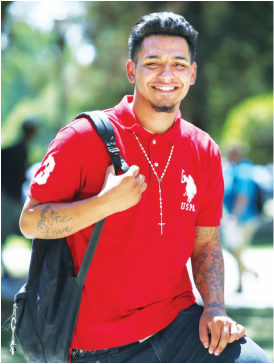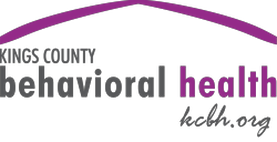College student gets extra support aimed at transitional-aged youth
 Former foster youth Tony Castellon says different therapy approaches may be more effective for transitional-aged youth (ages 16-24).
Former foster youth Tony Castellon says different therapy approaches may be more effective for transitional-aged youth (ages 16-24). Tony Castellon’s first memory of being put into foster care was when he was 12, although he later learned that he had actually been in and out of the system a few times before. A verbally abusive stepfather and a younger sister who battled cancer three separate times made for a tumultuous and traumatic childhood.
Tony was eventually diagnosed with post-traumatic stress disorder and attention deficit hyperactive disorder. In conjunction with the services he received through the foster system, he also received therapy through Kings County Behavioral Health.
Now 18 years old and a student at Fresno City College, Tony has “aged out” of traditional foster care. This is a vulnerable period for “transitional-aged youth” — young people from ages 16-24 that are no longer able to access the mental health services they had as children. Because they may not have connected to new care providers as an adult, these youth run the risk of slipping through the cracks.
Luckily for Tony, he was eligible for services to help with his transition out of foster care through Assembly Bill 12. Also referred to as “Extended Foster Care,” AB 12 was implemented in California in 2012 and aims to improve outcomes for youth in foster care by continuing to support them until they turn 21.
Although Tony credits the financial assistance that he’s received through AB 12 with his ability to enroll in junior college and buy a car, he feels that more progressive therapy offerings would be a tremendous improvement for transitional-aged youth coming out of foster care. The therapy that Tony received was primarily one-on-one counseling, in which he struggled to connect with his therapist. Tony speculates this problem is quite common among youth in foster care who have a history of abusive relationships with adults.
Tony eventually found an outlet in writing music and drawing, and in retrospect believes that had these activities been included in his therapy, he would have had a more positive experience.
“[Therapists] should get kids to think about their future, not their past,” he says, suggesting that questions about favorite hobbies, career aspirations and other goals might cultivate a more inviting conversation than questions strictly about family history and traumatic experiences.
Kings County Behavioral Health is adding two new therapy programs specifically designed to address the challenges faced by Tony and other transitional-aged youth.
As for Tony, he hopes to one day become a lawyer so he can advocate for foster youth in the future.
“I didn’t feel like I had an advocate, and I want to change that for someone else,” he says. “If you feel like the system is broken, you can’t just complain about it, you have to put the work in and change it yourself.”
Tony was eventually diagnosed with post-traumatic stress disorder and attention deficit hyperactive disorder. In conjunction with the services he received through the foster system, he also received therapy through Kings County Behavioral Health.
Now 18 years old and a student at Fresno City College, Tony has “aged out” of traditional foster care. This is a vulnerable period for “transitional-aged youth” — young people from ages 16-24 that are no longer able to access the mental health services they had as children. Because they may not have connected to new care providers as an adult, these youth run the risk of slipping through the cracks.
Luckily for Tony, he was eligible for services to help with his transition out of foster care through Assembly Bill 12. Also referred to as “Extended Foster Care,” AB 12 was implemented in California in 2012 and aims to improve outcomes for youth in foster care by continuing to support them until they turn 21.
Although Tony credits the financial assistance that he’s received through AB 12 with his ability to enroll in junior college and buy a car, he feels that more progressive therapy offerings would be a tremendous improvement for transitional-aged youth coming out of foster care. The therapy that Tony received was primarily one-on-one counseling, in which he struggled to connect with his therapist. Tony speculates this problem is quite common among youth in foster care who have a history of abusive relationships with adults.
Tony eventually found an outlet in writing music and drawing, and in retrospect believes that had these activities been included in his therapy, he would have had a more positive experience.
“[Therapists] should get kids to think about their future, not their past,” he says, suggesting that questions about favorite hobbies, career aspirations and other goals might cultivate a more inviting conversation than questions strictly about family history and traumatic experiences.
Kings County Behavioral Health is adding two new therapy programs specifically designed to address the challenges faced by Tony and other transitional-aged youth.
As for Tony, he hopes to one day become a lawyer so he can advocate for foster youth in the future.
“I didn’t feel like I had an advocate, and I want to change that for someone else,” he says. “If you feel like the system is broken, you can’t just complain about it, you have to put the work in and change it yourself.”
New SUPPORTS for Youth
Kings County Behavioral Health is currently in the process of adding two new therapy modules designed specifically to support transitional-aged youth like Tony:
Therapeutic Activity Groups
In partnership with Oakland-based Beats, Rhymes and Life, Inc., these groups will offer alternative whole health promotion strategies for marginalized and underserved youth. The program combines popular youth culture and community-defined strategies with proven therapy models that promote engagement, healthy relationships and leadership. Participants learn to share their stories and experiences with their peers through various art forms, dialogue, team-building activities and performance. This provides youth the opportunity to connect with their peers in a safe space where they can re-author their own narratives through creative mediums, such as drawing or writing hip-hop lyrics.
Youth Researching Resiliency
Youth participants in these groups will receive training from clinicians, researchers and evaluators as part of a participatory research model where they learn about services, and assess how effective they would be for their peers and communities. They will subsequently make recommendations to the county and providers on the models, approaches, etc. which will improve access and increase participation by transitional aged youth.
Therapeutic Activity Groups
In partnership with Oakland-based Beats, Rhymes and Life, Inc., these groups will offer alternative whole health promotion strategies for marginalized and underserved youth. The program combines popular youth culture and community-defined strategies with proven therapy models that promote engagement, healthy relationships and leadership. Participants learn to share their stories and experiences with their peers through various art forms, dialogue, team-building activities and performance. This provides youth the opportunity to connect with their peers in a safe space where they can re-author their own narratives through creative mediums, such as drawing or writing hip-hop lyrics.
Youth Researching Resiliency
Youth participants in these groups will receive training from clinicians, researchers and evaluators as part of a participatory research model where they learn about services, and assess how effective they would be for their peers and communities. They will subsequently make recommendations to the county and providers on the models, approaches, etc. which will improve access and increase participation by transitional aged youth.

 RSS Feed
RSS Feed